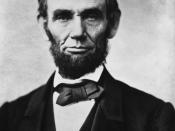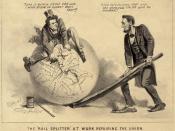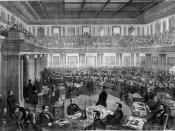One man's bullet would force him into the presidency, and but for one man's vote he would have been forced out.
Like the impeachment of President Clinton, the impeachment trial of President Andrew Johnson in 1868 also ended in an acquittal.And like President Clinton, Johnson was a Democratic president who faced a Republican-controlled Congress. And while many were hostile to him for his political agenda, it would be an event separate from his policies that would nearly bring him down.Before it would end, a drama would play out in the Senate filled with partisanship, legal hairsplitting, and the swing votes of a handful of Republicans.
The Road to Impeachment A "war" Democrat opposed to secession, in 1864 Johnson was tapped by Republican President Abraham Lincoln as his running mate to balance the Union ticket. He became president following Lincoln's assassination in April 1865, just days after the Civil War ended.
As president, Johnson's desire to scale back Lincoln's Reconstruction legislation following the Civil War angered the Radical Republican majority that sought to punish the former rebels of the Confederacy.
The stage was set for a partisan fight that would ultimately center around a single act. In February 1868, Johnson fired Secretary of War Edwin M. Stanton, who was sympathetic to the Radical Republicans and who was overseeing the military's Reconstruction efforts. A year earlier, Congress had passed the Tenure of Office Act, which prohibited a president from dismissing any officer confirmed by the Senate without first getting its approval. With Stanton's firing, the call for Johnson's impeachment began.
"To say that they seized the opportunity was too strong," says Michael Les Benedict, a history professor at Ohio State University and the author of The Impeachment and Trial of Andrew Johnson. "The president was in obvious defiance. He...


